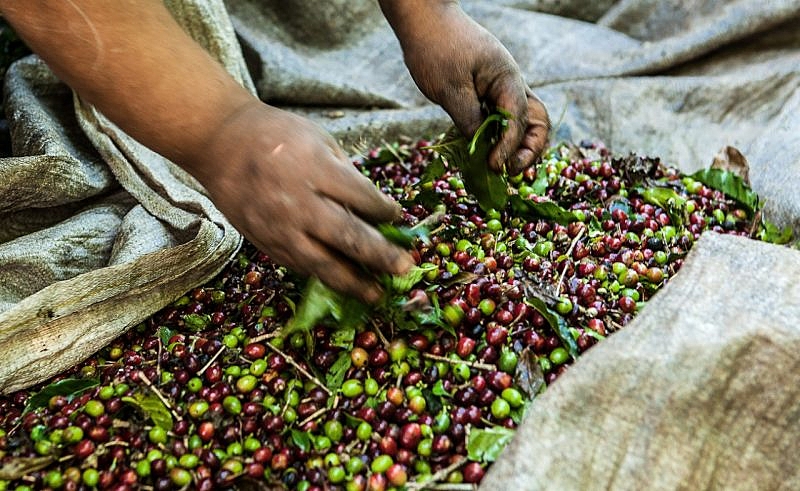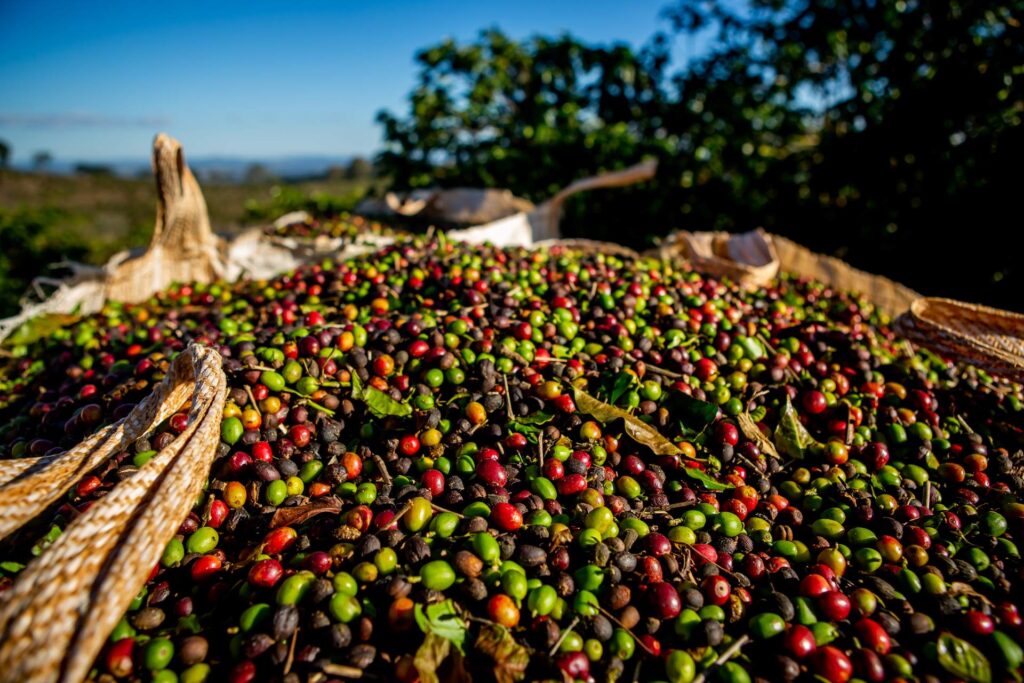A machine with a long handle and metal rods that simulate two hands has become an indispensable item in coffee harvesting in Brazil in recent years. With a gasoline-powered engine, the derriçadeira quickly knocks down the cherry stuck on the branches, while the worker moves the equipment from top to bottom in the coffee trees. Last harvest, temporary workers from Piedade Farm, in Campestre, Minas Gerais, had to pay out of their own pockets R$ 2,700 for the equipment, as determined by their employers, according to testimonials from workers and organisations interviewed by Repórter Brasil. The practice is prohibited by Brazilian law.
The property holds a Starbucks “ethical coffee sourcing” seal that has among its objectives the guarantee of labour rights and “the well-being of coffee growers and workers, their families and communities”. The R$ 2.7 thousand is equivalent to over 30% of the average monthly income of a seasonal worker, considering the average volume of coffee harvested over 6 days of work per week.
“We earn very little to pay that for a machine”, says João*, 52, one of the 30 workers who crossed the state in May last year, travelling over 700 kilometres from the Jequitinhonha Valley in the north of Minas Gerais, where they live, to work for four months on the Piedade Farm, in the southwest.

At the time, the property paid R$ 15 for the can of coffee harvested, the equivalent of 60 litres of the bean — which earned João an average daily rate of R$ 180, filling between 10 and 15 cans a day. “You already have the expense of what you eat, plus this expense with the machine? You will get back home after the harvest without any money”, he adds.
The report found, however, that there were cases of workers who could not get more than R$ 2.8 thousand per month in this harvest, which would mean that of the four months of work, one was entirely dedicated to the purchase of the machine that should be offered free of charge by the employer.
“It’s almost two minimum wages for a temporary worker, who the rest of the year has no resources for his own and his family’s livelihood. It is a practice that feeds this vicious cycle of poverty in rural areas”, condemns Jorge Ferreira dos Santos Filho, coordinator of the Articulation of Rural Workers of the State of Minas Gerais (Adere/MG), who was on the property at the beginning of June.
Piedade Farm has the C.A.F.E. Practices seal, a certification programme of the Starbucks coffee chain. Brazil, the world’s largest exporter of the bean, is one of the multinational’s main suppliers. The owner of the property, coffee grower Olga Maria Ferreira Tavares, has other plantations in neighbouring municipalities in the south of Minas Gerais. The properties, managed by her daughters, supply coffee to large cooperatives and have clients overseas.
“We are not talking about a small farm. We are talking about a large, certified farm that supplies coffee to a large company like Starbucks”, recalls Filho.
To the report, Starbucks said it was “deeply concerned to learn of the allegations of labour violations or poor working conditions” at Piedade Farm and that it plans to investigate the situations mentioned by the report. Read the company’s full position here. Repórter Brasil also tried to contact the producer by phone and email, but had not heard back as of writing this article. The space remains open for future manifestations.
Payment Triangulation
The R$ 2.7 thousand that each worker who did not have a derriçadeira had to pay for the machine had an obscure destination. According to sources heard by Repórter Brasil, the managers of Piedade Farm had initially said that the value of the derriçadeira would be deducted from the workers’ wages to reimburse the owners of the property.
However, after an inspection by Ministry of Labour inspectors on the property, in which the public servants warned that the practice was illegal, the argument changed. The farm managers then suggested to the seasonal workers that they pay for the machinery to the contractor, the person responsible for recruiting the group in the north of the state, which generated suspicion in the group. “The workers paid the contractor, but [the money] went to the farm itself”, believes Antônio*, who worked in the harvest, but took his own derriçadeira for the crop.

“Those who didn’t have the machine got there, bought it, and they were going to discount the payment. But as the Ministry [of Labour] came by and put pressure on them, they didn’t discount it and told us to pay the contractor for the machine”, explains João*, who also thinks that the value paid for the equipment was passed on to the farmers. The labour inspection at Piedade Farm occurred on May 24, at the beginning of the harvest on the property, so the labour inspectors did not identify any deductions from the temporary workers’ salaries. Only two violation notices are registered in the name of coffee grower Olga Tavares: the first for hiring an employee without registering it in the property’s book or electronic system and the second for hiring an employee without notifying the Ministry of Labour.
“It is a certified farm, which guarantees decent housing for the permanent workers, which is why we were surprised at the practice of buying the machinery through a contractor and this machinery being sold to the workers”, points out Jorge Ferreira dos Santos Filho, coordinator of Adere/MG.
The Ministry of Labour has registered other cases of illegal deductions from the wages of workers who work temporarily in the coffee harvest to pay for the derriçadeira. This is what happened on the family farm of the president of the country’s largest coffee cooperative, Cooxupé. In 2021, relatives of Carlos Augusto Rodrigues de Melo were fined for irregularly deducting 30 per cent of the wages of 19 workers at Pedreira Farm, in Cabo Verde, southern Minas Gerais. The property is managed by Rodrigues de Melo’s daughter, but documents show that the entire family benefits from the profits obtained from the property.
In this case, the farm deducted R$ 500 per month from the workers’ wages for the purchase of the machine, in addition to another R$ 500 for the fuel used in the tool. After the infraction, the landowners signed an agreement with the Labour Public Prosecutor’s Office and the Public Defender’s Office to return the money unduly deducted and indemnify each worker in R$ 2,000 for moral damages
Solution proposed by the farm is also irregular
As it instructed the workers to acquire a machine, according to reports from the workers interviewed by Repórter Brasil, the Piedade Farm management offered R$ 50 per month as rent for the equipment. This agreement, however, is also illegal. Brazilian labour legislation ensures that the supply of tools should be free of charge and that the equipment should be safe, adequate and replaced whenever necessary. “In the labour legislation, there is no legal provision for tool rental made with the employee”, explains Leandro Marinho, a tax auditor in Varginha (MG).
Since it is equipment that requires fuel, this also needs to be provided by the employer, who should also be responsible for its maintenance. But, in this scenario of “renting” the derriçadeira, all maintenance costs and eventual repair of the equipment are borne by the workers. “This is a business risk that is being passed on to the employee”, criticizes Marinho.
Besides being illegal, the amount of R$ 50 paid by the property seems little to Antônio*, given the expenses that a worker may have with the equipment. “The harvest lasts four months. If the machine breaks down, we are the ones who must pay for maintenance. These R$ 200 [the sum of the rent for the four months] are not even enough to repair the machine when it breaks down.
“This type of ‘rent’ will force the employee to acquire a derriçadeira to be hired, which even falls under the law of discrimination, as it would be a discriminatory and limiting practice for access to the labour relationship”, concludes the tax auditor in Varginha.
“The farm made a rental contract there for R$50 a month. It was a way of removing from their responsibility the obligation of providing the machine. It says that it pays for the renting of the machine, but doesn’t say that it demanded that the workers buy the equipment”, adds Jorge Ferreira dos Santos Filho, from Adere/MG.
In the case of the workers at Piedade Farm, there is no certainty about receiving the R$50 a month for the “rental” of the equipment. “This was paid on the day of the settlement. They did the settlement the way they wanted, so there is no way of knowing if someone received it or not”, João points out.
Cold shower
The housing conditions of the temporary workers also caught the attention of the Adere-MG team. Workers had to store their belongings in their own beds as there was only one wardrobe, but no drawers, shelves or ceiling. “The lodging had an old refrigerator and a cupboard to store food. The mattress was old, there was no pillow. If you wanted a pillow or blankets, you had to bring them with you”, explains João. A wood cooker and a gas cooker were also used to heat the shower water, as there was no electric shower. “You arrive tired and still need to heat the water. The time you have to heat the water you could have taken a shower”, explains João.
“The accommodation was messy and the bathroom was all in shambles, with no flooring or even a tile on the wall”, describes Antônio, who still concludes, resigned: “But inside the sun doesn’t burn and the rain doesn’t drip on us”.
*Names changed to preserve the anonymity of the workers


